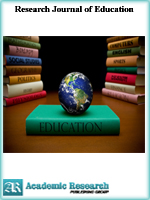Research Journal of Education
Online ISSN: 2413-0540
Print ISSN: 2413-8886
Print ISSN: 2413-8886
Quarterly Published (4 Issues Per Year)

Archives
Volume 7 Number 4 December 2021
Building a Scale to Measure the Psychological Effects of the COVID -19 Coronaviruson Omani University Students
Authors: Khalifa Ahmed Humaid Al Qassabi ; Rabia Al Mur Al Dhuhli ; Aaisha Khalifa Ahmed Al Qassabi
Pages: 176-187
DOI: doi.org/10.32861/rje.74.176.187
Abstract
The world was surprised by the outbreak of the COVID-19 pandemic. The pandemic started in China and rapidly spread in the world. This pandemic impacted different aspects of life such as the economy, health, and social life. The study aimed to build a tool to measure the psychological effects of the corona COVID-19 pandemic on Omani university students. The sample of the scale consisted of (566) students from different Omani universities. The researcher used an electronic method to distribute the questionnaire, which was Google Drive. Fifty-nine factors were used in its initial form to measure the psychological effects of the pandemic on Omani university students. The results showed that the tool is an appropriate indication of validity and reality. They revealed the results of factor validity and face validity on a scale consisting of (45) items divided into five areas: thinking about the future, pressures resulting from the requirements of the study, restrictions of movement and communication, and concern about the disease. The study recommended that student councilors and people in charge of Omani universities can use this measure to overcome the psychological effects of the pandemic on students and conduct other studies to verify the applicability to other samples.
Self-fulfilling Versus Self-destructive Adolescents: Exploration of Relations among Resilience, Well-Being, and Life Satisfaction
Authors: Elisabetta Sagone ; Maria Luisa Indiana ; Elena Commodari ; Salvatore Luciano Orazio Fichera
Pages: 168-175
DOI: doi.org/10.32861/rje.74.168.175
Abstract
This study examined the differences between adolescents with a self-fulfilling profile and those with a self-destructive profile in resilience, well-being, and satisfaction with life. The Resiliency Attitudes and Skills Profile (De Caroli & Sagone, 2014a) was used to measure sense of humor, competence, adaptability, control, and engagement; the Life Satisfaction Scale (Di Fabio & Gori, 2016), the Psychological Well-Being Scale (Ryff & Keyes, 1995) was used to explore general psychological well-being; the Positive (PA) and Negative (NA) Affect Scale (Di Fabio & Bucci, 2015) was applied to measure the two opposite affective profiles, self-fulfilling (high PA and low NA) and self-destructive profile (low PA and high NA). Results showed that adolescents with a self-fulfilling profile reported higher resilience, life satisfaction, psychological well-being than those with a self-destructive profile. Future research could deep protective factors of self-fulfilling profile and risk factors of self-destructive profile in adolescence.
A Personal Account: Attaining Muscle Memory and Higher Mental Functioning
Authors: James S. Payne
Pages: 161-167
DOI: doi.org/10.32861/rje.74.161.167
Abstract
Many articles have been written about elite performers that attain muscle memory and experience flow and zoneness. This article details how the author personally attained higher level performance and explains the feelings experienced during the process. A one-person study was designed to experience muscle memory and explore the mental aspects of putting. Twenty thousand attempts (strokes) were used. The design included four parts; a) Establish Baseline, b) Master Mechanics, c) Experience Muscle Memory, and d) Explore Mental Aspects. The conversion rate for the first 1,000 attempts during baseline was 58.3 percent and for the last 1,000 attempts was 90.4 percent. The concept of deliberate practice was used throughout the study showing performance increases. When experiencing muscle memory it was found to be boring and far from fun. When the mental aspects were explored the concepts of flow and pre-live generated enthusiasm and joy.



